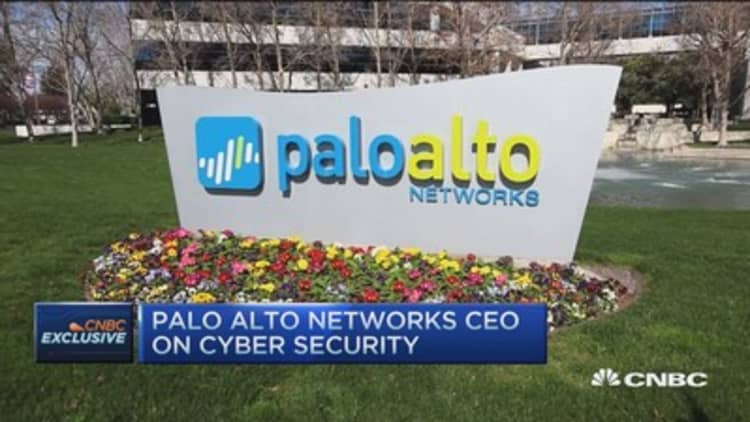
Corporate executives should not depend on cybersecurity insurance to provide a safety net, and should instead focus on updating "cobbled together" legacy technology systems, Palo Alto Networks CEO Mark McLaughlin said Monday.
A rash of hacks on U.S. companies over the past two years has prompted insurers to massively increase premiums for some companies, leaving firms that are perceived to be a high risk scrambling, Reuters reported Monday.
On top of rate hikes, insurers are raising deductibles and in some cases limiting the amount of coverage to $100 million, leaving many potentially exposed to big losses from hacks that can cost more than twice that.
Read More
"I think what it means is that ... insurance is not the answer to the security issue," McLaughlin told CNBC's "Squawk on the Street."
"The reason you can't get insurance policies that actually pay out or get them at reasonable rates is the insurance business knows how to manage risk, right? They have no idea what this risk is here, the magnitude or what to do about it."
McLaughlin made his comments while in New York City to launch a new book by Palo Alto and the New York Stock Exchange that aims to demystify cybersecurity for corporate board members and executives called "Navigating the Digital Age: The Definitive Cybersecurity Guide for Directors and Officers."
Palo Alto Networks sells enterprise security hardware and virtual products.
In the current corporate environment, 25 years of legacy technology has been cobbled together to ward off attacks, putting companies at a disadvantage to hackers, McLaughlin said.
For that reason, he said, many companies need to start over and rebuild their servers from the ground up.
Read MoreApple becoming 'target' for hackers: Expert
That transition will take a long time, and is a driving force behind a "good part" of Palo Alto's business, he said.
"When customers are purchasing our technology, they realize the disruptive nature. It takes years then to replace things," he said. "It's a long cycle, but from a repeat sale perspective for us, that's one of the reasons our business is growing so well."
Palo Alto grew fiscal-year 2015 revenue 55 percent year over year to $928.1 million. It has added more than 1,000 customers each quarter for the last 15 quarters.
— Reuters contributed to this story. CNBC's Deborah Findling contributed reporting to this story.


